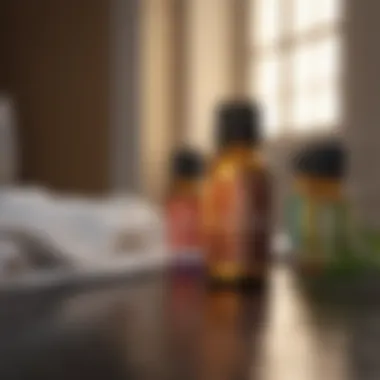Enhancing Laundry with Essential Oils: A Guide


Intro
When it comes to laundry, most people think of detergent and fabric softener as the primary agents of cleanliness and fragrance. However, there's a growing trend that’s turning heads—the integration of essential oils into laundry practices. The allure of these plant-derived oils goes beyond their delightful scents; they boast a range of benefits that can elevate the mundane chore of washing clothes into a more holistic experience.
Essential oils, extracted from various plants, are not just for diffusing in your living space or adding to baths. Their incorporation into laundry can contribute to fabric care, offer a natural alternative to chemical-laden products, and infuse a fresh, pleasant scent that lingers long after the washing is done. Those keen to enhance their laundry routine will find this guide diving into the ins and outs of using essential oils effectively and safely.
The Significance of Essential Oils in Laundry
Exploring essential oils in the laundry realm opens doors to both practicality and personal expression. These oils come with a variety of properties—some fight bacteria, while others may help in softening fabrics naturally. With a myriad of options, individuals can choose oils based on their preferences, needs, and even the type of fabrics they wash.
Moreover, mindful consumption is at the forefront of many modern lifestyles. In a world often filled with synthetic products, opting for natural, eco-friendly solutions resonates deeply with homeowners and families aiming for safer living environments.
In the upcoming sections, we'll delve into:
- Different types of essential oils that work wonders in laundry settings.
- Methodologies for integrating these oils seamlessly into your wash cycles.
- Health and safety considerations for you and your loved ones.
- Choices to make depending on desired outcomes, alongside potential pitfalls to avoid.
Prelude to Essential Oils in Laundry
Understanding the role of essential oils in laundry isn’t just an exploration of fragrant additives; it opens up a realm of possibilities for both practical application and sensory enhancement. As many householders strive for cleaner and healthier living spaces, the integration of essential oils into laundry routines offers an appealing approach to elevate the everyday chore of washing clothes. From their historic uses in various cultures to their present-day appeal, these natural compounds can significantly transform our laundry experiences.
Defining Essential Oils
Essential oils are concentrated liquids extracted from plants, capturing the natural fragrance and essence of their source. They are often created through distillation or cold pressing, methods that enhance their potency. What distinguishes essential oils from other types of oils is their volatile nature and strong aroma, which makes them effective for scenting, therapeutic, and even cleaning purposes. Householders may find that a drop or two of lavender oil can not only impart a lovely scent to linen but also contribute to a calming environment.
History and Usage of Essential Oils
The use of essential oils dates back thousands of years, intertwining with humanity's quest for enhanced living conditions. In ancient Egypt, aromatic oils were employed in both daily routines and ritual practices, creating a holistic approach to wellness that honored both body and spirit. Fast forward to the present, essential oils have become a staple in many homes, reflecting a shared desire to return to nature.
Now, using these oils in laundry practices is gaining traction among eco-conscious individuals. Rather than opting for synthetic fragrances, the choice to infuse natural aromas into laundry reflects a commitment to health and sustainability. For example, an eco-conscious householder may choose peppermint oil not just for its refreshing scent, but also to benefit from its natural antimicrobial properties while laundering towels or bedding.
In summary, essential oils in laundry aren't merely a trend; they represent a reconnecting with age-old practices that place value on the purity of ingredients and their multifaceted benefits. As we delve deeper into this topic, the forthcoming sections will uncover the myriad advantages, selection tips, and methods for integrating these oils into the laundry process.
Understanding the Benefits
When it comes to laundry, most folks think of detergent and bleach as the heavy lifters in the scent and cleaning department. However, integrating essential oils offers a fresh and invigorating twist to this mundane task. Understanding the benefits of essential oils isn't just a matter of enhancing the aroma; it's about embracing a holistic approach to cleaning that champions both health and the environment. These concentrated plant extracts can transform not only how your laundry smells but also elevate the experience in a multitude of ways.
Enhancing Scent and Freshness
Imagine pulling out a warm batch of clothes that smell not just clean, but invigorating. Essential oils like lavender or lemon can elevate your laundry to new aromatic heights. Unlike regular fabric softeners or synthetic scents that can leave a chemical residue, essential oils offer a pure, robust fragrance. They can delight your senses and envelop your laundry in freshness that lasts.
To achieve this, simply add a few drops of your chosen oil directly to your laundry load. This method can provide a significant boost to the freshness factor, especially if you're dealing with items that are prone to mustiness—think gym clothes or towels.
Natural Disinfectant Properties
While essential oils make clothes smell fabulous, they also pull double duty as natural disinfectants. Oils like tea tree and eucalyptus carry antibacterial and antifungal properties. This means that they become an ally against odors caused by bacteria, particularly in items that get sweaty or are stored for a while.
Consider this: an essential oil-infused wash can tackle germs without the harshness of traditional chemicals, making it a safer option for households with pets or small children. Using essential oils in your laundry can lead to a more hygienic home environment without compromising safety.
"Natural doesn't just mean better smell; it can mean better health too."
Fabric Care and Maintenance
And then there's the win-win of fabric care. Essential oils also aid in the longevity of your fabrics. For example, oils like chamomile or rosemary can help maintain the integrity of your clothes while adding a layer of aroma that screams luxury rather than laundry.
Choosing oils wisely can yield great results:
- Lavender: Softens fabrics and is known for its skin-calming properties.
- Peppermint: Not only invigorates but also helps to repel pests.
- Ylang Ylang: Adds a touch of elegance, reducing static cling and improving overall fabric feel.
Integrating essential oils into your laundry routine isn’t just a gimmick; it’s an enriching experience that can elevate how you approach washing day. You’re not merely cleaning clothes; you're curating an atmosphere. In doing so, you're investing not just in cleanliness, but also in the health of your textile investments.
Choosing the Right Essential Oils
Selecting the right essential oils is a fundamental aspect when incorporating them into your laundry routine. With a plethora of options available, understanding the properties of different oils can help you choose the one that best suits your needs. Whether you’re aiming for a calming fragrance or seeking natural disinfecting properties, each oil brings its unique characteristics to the table.


Essential oils not only add pleasing scents but also can enhance the overall laundry experience. They can transform the mundane chore of washing clothes into a fragrant journey. Knowing the effects of each essential oil can make a big difference, tailored to your preferences and desired outcomes.
Popular Oils for Laundry Applications
Lavender
Lavender is celebrated not just for its delightful aroma but for its calming effects. It’s like a warm embrace after a long day. This essential oil is a popular choice for relaxation, as its scent reportedly helps to reduce anxiety and create a peaceful atmosphere. People often toss a few drops into their laundry for a fresh and soothing scent. The unique feature of lavender is its versatility. It pairs well with various fabrics, making it an excellent choice for everything from bed linens to delicate garments.
However, one must be aware that lavender can sometimes overwhelm sensitive noses, leading to an overpowering scent. Balance is key when using it in the wash.
Lemon
Lemon essential oil takes freshness up a notch. The bright, zesty aroma is invigorating, often reminding one of sunny days and cleanliness. This oil is well-known for its natural antibacterial properties, making it an effective choice for adding a crisp, fresh scent while also providing disinfection. The unique aspect of lemon is that it can effectively cut through grease and stubborn smells, lending an extra oomph to laundry routines.
On the downside, lemon oil can be phototoxic, meaning it may cause skin irritation if clothing is exposed to sunlight after washing. Caution should be taken to let clothes dry in the shade if lemon has been used.
Tea Tree
Tea tree oil is often hailed for its powerful antimicrobial qualities. When incorporated into laundry, it not only helps to crisp up fabric but also combats fungi, bacteria, and viruses. Its distinctive medicinal scent is particularly favored by those who appreciate a more earthy aroma. The key characteristic of tea tree oil is its ability to naturally sanitize, making it a staple for households aiming for a cleaner, healthier laundry experience.
The disadvantage, however, may lie in its strong scent, which is not to everyone’s liking. Some might find it overly intense, impacting how the laundry smells post-wash.
Peppermint
Peppermint oil is like a refreshing gust of wind. Its invigorating scent is known for boosting energy and enhancing focus, making it a popular choice for those wanting a little pep in their step. In laundry applications, peppermint can provide a fresh, clean scent that lingers delightfully on fabrics. Its unique feature is its cooling effect, which can be refreshing during warm weather or after exercise.
That said, peppermint’s strong aroma can clash with other scents, especially if mixed with sweeter or floral oils. Careful blending is essential to achieve a harmonious olfactory result.
Selecting Oils Based on Desired Outcomes
Relaxation
Relaxation is a significant aspect when considering essential oils. It sets the tone for a restful environment, making laundry a less stressful task. Oils like lavender not only enhance the scent but also play a vital role in creating a tranquil atmosphere. Choosing oils known for their calming effects can help turn laundry time into a soothing ritual.
The benefit is clear: a relaxed mood might lead to an overall decrease in stress levels. But too much of a good thing can lead to a monotonous atmosphere, so it’s wise to mix oils to keep things interesting.
Uplifting Scents
Uplifting scents can transform laundry into an energetic experience. Incorporating citrus oils like lemon can invigorate and brighten the routine. The refreshing fragrance can boost your mood, making the task feel less tedious. It’s a beneficial option for those who want their laundry to not only smell good but also lift spirits.
However, strong citrus scents may overwhelm others, making it essential to find a balance that works for your household.
Antimicrobial Effects
Antimicrobial properties are crucial in today’s world, especially when hygiene is a priority. Oils like tea tree not only scent your laundry but also provide a protective barrier against various germs and bacteria. This makes them an excellent choice for families with kids or anyone who engages in outdoor activities.
The advantage here is clear: healthy laundry equates to healthy living. But be cautious; over-relying on potent antimicrobial oils can lead to a different balance of scents and might require complementary scents to ensure a pleasant aroma.
Methods for Incorporating Essential Oils
Incorporating essential oils into your laundry isn’t just a trend; it represents a shift towards a more natural, health-conscious approach to fabric care. The methods you choose can significantly affect not only the scent of your laundry, but also its cleanliness and longevity. Selecting the right technique can help control specific aspects such as intensity of fragrance, antimicrobial properties, and maintenance of fabric integrity. This section will delve into three primary methods for integration: direct addition, dilution with carriers, and using essential oil-infused products. Each method has unique advantages that cater to different preferences and laundry needs.
Direct Addition to Laundry
The simplest and perhaps most direct way to elevate your laundry experience is through adding essential oils right into the wash cycle. Typically, this involves placing a few drops of your chosen oil into the detergent compartment or directly on the laundry itself.
Benefits of this method include:
- Immediate Freshness: As the oil mixes with water, it releases a refreshing aroma that permeates fabrics almost instantly.
- Antimicrobial Action: Oils like tea tree or lavender possess natural disinfectant properties, aiding in eliminating bacteria alongside your regular detergent.
- Effortless Integration: You can easily adapt this method to your existing routine with no need for special equipment or preparations.
However, caution is necessary; some oils, when improperly used, can potentially cause discoloration or irritation. Always perform a patch test on a small fabric area to ensure compatibility.
Dilution with Carrier Solutions
Another effective approach is dilution. This is particularly useful for stronger oils that may otherwise overpower laundry with an intense scent or cause fabric damage. Mixing essential oils with carrier solutions, such as water, vinegar, or baking soda, allows for a more controlled application.


Key points to consider:
- Balanced Scent: This method rounds out the scent profile, providing a subtle fragrance that won’t overwhelm laundry or cause discomfort for sensitive noses.
- Enhanced Efficacy: Carrier solutions can help distribute essential oils evenly, ensuring that every item in the load receives a fair share.
To implement this method, mix several drops of essential oil with about half a cup of a carrier solution, and add it at the start of the wash. This way, the contents have ample time to blend before the rinse cycle.
Using Essential Oil-Infused Laundry Products
If blending oils and experimenting isn’t quite your style, you might consider going for already infused products. Many brands now offer items like laundry detergents or fabric softeners that contain essential oils.
Advantages to this choice are:
- Convenience: Pre-mixed products offer an easy alternative for those with a busy schedule who still want to enjoy the benefits of essential oils without extra work.
- Consistency: These products are formulated to deliver consistent results, right out of the bottle. You can rest assured knowing you’re using an appropriate concentration of oils.
- Potential for Added Benefits: Many of these products not only include fragrance oils but also incorporate additional cleaning ingredients that complement the essential oils’ properties.
When pursuing this method, it's important to check the ingredient list for purity. Some products may contain synthetic fragrances, which can negate the natural benefits of essential oils.
"The key to integrating essential oils into your laundry is understanding how to blend their benefits with proper application methods. It’s a craft that not only refreshes your fabrics but also enriches your living space."
With these methods, the goal is to not only achieve fresh laundry but to create a more aromatic atmosphere within your home. Choosing the right method ultimately hinges on personal preferences and specific laundry requirements. By exploring each option, you can discover the one that fits your lifestyle while keeping your fabrics in tip-top shape.
Quality and Safety Considerations
Integrating essential oils into laundry practices is not merely about enjoying delightful aromas or sprucing up the ambiance of your washing routine; it comes with a set of quality and safety considerations that should not be overlooked. Ensuring that the oils you choose are of high quality can significantly impact the effectiveness of their usage as well as the safety for your family. From choosing the right oils to understanding how to handle them safely, taking heed of these elements protects both your fabrics and those who rely on them.
Choosing High-Quality Oils
To make the most of essential oils in your laundry, it’s paramount to prioritize quality over price. Cheap oils often come from synthetic sources and may contain fillers that undermine their efficacy. When you consider the potential benefits of aromatherapy and natural cleaning agents, investing in high-quality oils can transform your laundry experience. Look for oils that are labeled as 100% pure, with no added synthetic fragrances or artificial constituents.
- Therapeutic grade: This indicates a higher standard in terms of purity and intended use.
- Plant origin: Check the label for details on where the oil originates. Oils cultivated from well-maintained plants in suitable environments are often more effective.
- Extraction method: Steam distillation or cold pressing usually yield better quality oils compared to chemical extraction.
Health and Skin Sensitivity
While essential oils can enhance your laundry, it’s crucial to consider health and skin reactions, especially if you or someone in your household has sensitive skin. Even pure, high-quality oils can sometimes cause irritation if not used properly. Here are some guidelines:
- Patch test: Before incorporating a new oil, dilute a small amount with a carrier oil and apply it on a tiny skin area to check for reactions.
- Dilution is king: Always dilute essential oils before direct contact with skin, particularly if you're planning to use them in laundry that will be worn.
- Choose wisely: Some oils, like peppermint or cinnamon, are known to be more irritating than others. Lavender and chamomile are generally well-tolerated.
Storage and Handling of Oils
How you store and handle essential oils can greatly affect their shelf life and overall effectiveness. Proper storage prevents the oils from losing their potency, especially when exposed to light, heat, or moisture. Here are some tips:
- Dark, glass containers: Always use dark glass bottles for storage. They shield the oils from UV rays that can degrade their quality.
- Cool and dry place: Store oils in a cool, dark cabinet rather than on well-lit countertops or near heat sources like stoves.
- Keep them sealed: Ensuring that the caps are tightly sealed prevents evaporation and contamination.
"High-quality essential oils can not only elevate your laundry experience but also safeguard your family's health if handled with care."
When it comes to integrating essential oils into laundry routines, the quality and safety considerations are central to achieving the desired results while also ensuring a safe environment. By choosing quality oils, being mindful of health concerns, and taking care with their storage and handling, you set the stage for a laundry experience that's not only aromatic but also practical and safe.
Common Challenges and Pitfalls
Integrating essential oils into laundry can be a delightful journey, but it isn’t without its own set of challenges. Understanding these potential pitfalls is key for housewives and house owners who aim to enhance their laundry experience without running into issues. Being proactive in this regard ensures that the benefits of essential oils can be fully realized without causing any unexpected complications.
Undesired Odors or Interactions
While essential oils provide delightful fragrances, there can be instances where the scent may not align with your laundry's needs. Sometimes, the blend of various oils with other detergents or softeners can lead to a fragrance clash. This can result in an odor that’s more off-putting than pleasing.
To mitigate this:
- Test small amounts: Before fully committing to a combination, try a small load to see how the fragrances interact.
- Keep scents complementary: Aim for oils that naturally blend well. For example, lemon and lavender can create a fresh, soothing aroma, while mint may clash with more floral scents.
- Mind your sensitivities: Some people are more sensitive to certain scents. If you have family members who can be affected, it’s wise to consider their preferences and potential allergies.
"A little trial can save you from a lot of error. Finding the right mix may take time, but the payoff is worth it."
Potential Stains or Fabric Damage
Another major concern when using essential oils in laundry is the possibility of stains or damage to fabrics. Oils are concentrated and potent; they can sometimes leave marks on sensitive textiles, especially if not used properly.
Here are some considerations to keep you cruising smoothly:
- Dilution is key: Always dilute essential oils in a carrier oil or through a laundry solution before adding them to your wash, especially for delicate fabrics like silk or lace.
- Always inhale first: Check how your fabrics react to the oils. A small drop on an inconspicuous area can help you gauge if staining might occur.
- Choose wisely: Some oils are more prone to leaving stains, such as patchouli or sandalwood. It’s best to stick to lighter oils, especially for brighter or lighter-colored fabrics.
By being vigilant about these common challenges, you’ll find your experience with essential oils in laundry can be rewarding rather than problematic. Just as in life, a little prep work goes a long way in ensuring everything comes out smelling fresh and looking great.


Alternatives to Essential Oils
When it comes to enhancing laundry routines, essential oils have garnered much attention, but they aren't the only option. It's crucial to discuss alternatives that can provide similar benefits in terms of scent, freshness, and fabric care. Understanding these alternatives is essential, especially for those who may have sensitivities to essential oils or prefer different approaches. With a wide array of products available, knowing what to choose and their respective pros and cons can help you create the laundry experience you desire.
Synthetic Fragrance Products
Synthetic fragrance products are designed to imitate the scent profiles of various natural fragrances. These products can be found in all sorts of formats, from fabric softeners to laundry detergents. Many people appreciate the immediate scent boost they provide. Here are a few considerations:
- Economical: Synthetic fragrances are often less expensive than their natural counterparts, making them a budget-friendly choice for some households.
- Variety: There's a vast range of scents available, allowing for personalized experiences. Have a preference for something tropical one day and a cozy vanilla the next? These products cover all bases.
- Longevity of Scent: The general formula of synthetic fragrances allows them to last longer in clothes, maintaining their fresh scent through multiple wearings.
However, there are significant drawbacks to consider:
- Health Concerns: Some synthetic fragrances can cause allergic reactions or skin sensitivities. If the household includes individuals with asthma or other respiratory conditions, it’s wise to stay vigilant about these products.
- Environmental Impact: Many synthetic fragrances are derived from non-renewable resources and can contain harmful chemicals, raising concerns among eco-conscious users.
- Artificiality: The lack of natural ingredients may leave some feeling like something is off with their laundry, possibly resulting in a less clean feeling.
"Just because it smells nice doesn’t mean it’s good for you or the environment."
Natural Fabric Softeners
Natural fabric softeners offer another alternative that avoids the harsh chemicals often found in commercial laundry additives. Typically made from plant-derived components, these products aim to condition fabrics while enhancing softness. Here are some highlights:
- Gentler on Fabrics: Natural softeners usually do not contain the harmful additives found in some traditional softeners. This can contribute to extending the life of your clothing.
- Eco-Friendly Choices: Many natural options come in biodegradable packaging, allowing for a sustainable laundry practice.
- Minimal Ingredients: These often require fewer additives, which can be appealing to those concerned about what goes into their laundry.
Some examples of natural softeners include:
- Vinegar: Known as a natural conditioner, adding vinegar to the rinse cycle can help soften clothes and combat odors.
- Baking Soda: While it's typically a deodorizer, baking soda can also soften clothes. Using it in conjunction with vinegar can promote cleaning efficacy.
- Commercially Made Products: Several brands now offer certified natural fabric softeners formulated with safe ingredients, free from synthetic preservatives.
There’s clearly a spectrum of alternatives out there. Each option comes with its own set of merits and challenges, creating a rich landscape of choices for those wishing to enhance their laundry practices without essential oils.
Case Studies and Practical Applications
Integrating essential oils into laundry routines has gained traction among eco-conscious users and laundry aficionados alike. This section shines a spotlight on real-life experiences and expert insights that illustrate the practical implications and benefits of using essential oils in laundry. By examining these case studies, readers can appreciate not only the applicability but also the transformative nature of essential oils in enhancing everyday laundry practices.
Experiences from Eco-Conscious Users
Many individuals who have turned toward eco-friendly living often share their stories to inspire others. For example, Jennifer, a stay-at-home mom in California, began incorporating essential oils into her family's laundry as a means to reduce reliance on synthetic fragrances. "I used to dread the overpowering smells from commercial detergents, but once I switched to lavender essential oil, my laundry smells like a peaceful meadow,” she reported.
Jennifer's experience highlights a common theme among eco-conscious users: the desire for a natural alternative that enhances scent without harsh chemicals. Most of her friends made the switch purely for the enticing aroma, but Jennifer also noted improvements in her family's skin sensitivity. Oils like tea tree or peppermint, known for their antimicrobial properties, became staples in her laundry routine.
Moreover, a discussion thread on Reddit reveals other users lending advice on mixtures and specific dosages. A participant mentioned how tea tree oil not only acted as a freshener but also helped in tackling mold in towels that often sat damp. They recommended adding a few drops directly to the rinse cycle to maximize its potency.
Real experiences like these present a wealth of knowledge; by connecting with others who share similar goals, eco-conscious users foster community learning while simultaneously reaping the benefits of essential oils.
Expert Recommendations and Insights
Experts in the field of natural cleaning often emphasize the importance of responsible use of essential oils in laundry. Dr. Melissa Swanson, a botanist and sustainability advocate, suggests that while essential oils like lemon and eucalyptus can elevate laundry quality, understanding the potential pitfalls is crucial. "Using too much can cause bolder scents, which might not appeal to everyone. It's a balancing act," she often reminds her clients.
In her seminars, Dr. Swanson encourages experimenting with different oils while documenting results—thereby creating a customized laundry experience. For instance, she often recommends mixing cedarwood essential oil with a mild carrier oil, alleviating skin irritation issues while ensuring clean linens.
"The art of using essential oils lies in understanding their unique properties and how they interact with fabrics and other oils. Knowledge is key," says Dr. Swanson.
Experts also advocate for proper storage and handling practices. As they explain, storing oils in dark glass bottles away from heat helps preserve their integrity. They add that when blending oils for the laundry, it's wise to start small, as certain combinations could create unexpected reactions with synthetic fabrics, particularly those adorned with synthetic dyes.
In sum, the experiences of everyday eco-conscious users alongside expert recommendations establish a robust foundation for understanding the dynamic relationship between essential oils and laundry practices. By learning from various perspectives, readers can navigate their journeys effectively, making informed choices that benefit both their homes and their health.
Culmination
The conclusion of this article encapsulates the significance of integrating essential oils into laundry routines. As households increasingly prioritize sustainable and health-conscious choices, the use of essential oils in laundry emerges as a compelling option. Not only do these natural extracts confer delightful fragrances, but they also serve as natural disinfectants, providing added peace of mind in maintaining hygiene without the harsh chemicals often found in conventional products.
Summary of Key Points
Essential oils, derived from plants, aren't just for aromatherapy or cosmetic purposes. Within the context of laundry, several key takeaways emerge:
- Enhanced Freshness: Oils like lavender and lemon impart fresh scents, transforming the laundry experience.
- Natural Disinfectants: Many essential oils possess antimicrobial properties, reducing bacteria and viruses on fabrics.
- Fabric Care: Essential oils can contribute to the longevity of fabrics, mitigating wear and tear when used correctly.
- Customizable Solutions: Users can tailor their selection of oils to suit personal needs, such as stress relief or invigorating scents.
On the flip side, there are challenges, such as undesirable odors or fabric reactions, that need to be navigated carefully. Ultimately, the thoughtful integration of essential oils paves the way for both environmental and personal benefits within routine laundry processes.
Future Trends in Laundry Practices
Looking ahead, several trends signal the growing integration of essential oils in laundry:
- Increased Awareness and Demand: As more people become aware of the benefits of natural products, we can expect a rise in demand for essential oil-infused laundry solutions. Consumers will seek more transparency in their laundry products, leading to an uptick in brands focusing on quality essential oils.
- Sustainability Focus: The push toward eco-friendly practices will drive innovation in laundry detergents and fabric softeners that combine effective cleaning with essential oils. This indicates a shift to products that blend effective cleaning power with nature-derived ingredients.
- Convenience in Incorporation: We might see advancements in formulation and packaging that facilitate easy use of essential oils in laundry, like pre-measured pods or dryer sheets infused with scents.
- Holistic Hygiene: The trend towards holistic health may expand to laundry practices, with consumers seeking comprehensive wellness benefits in their daily chores.















